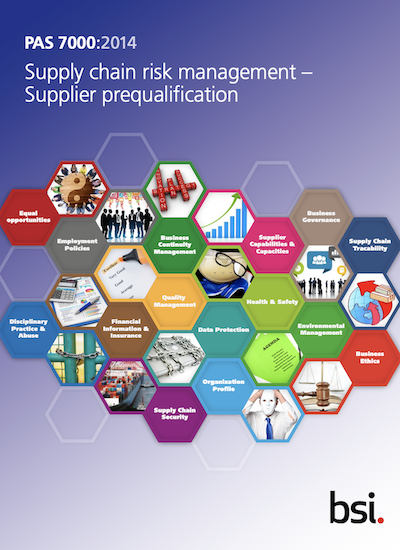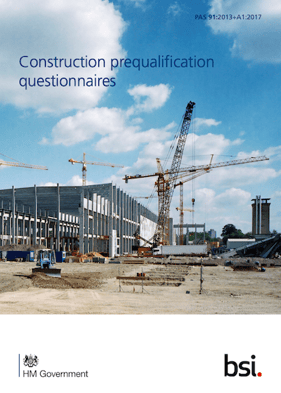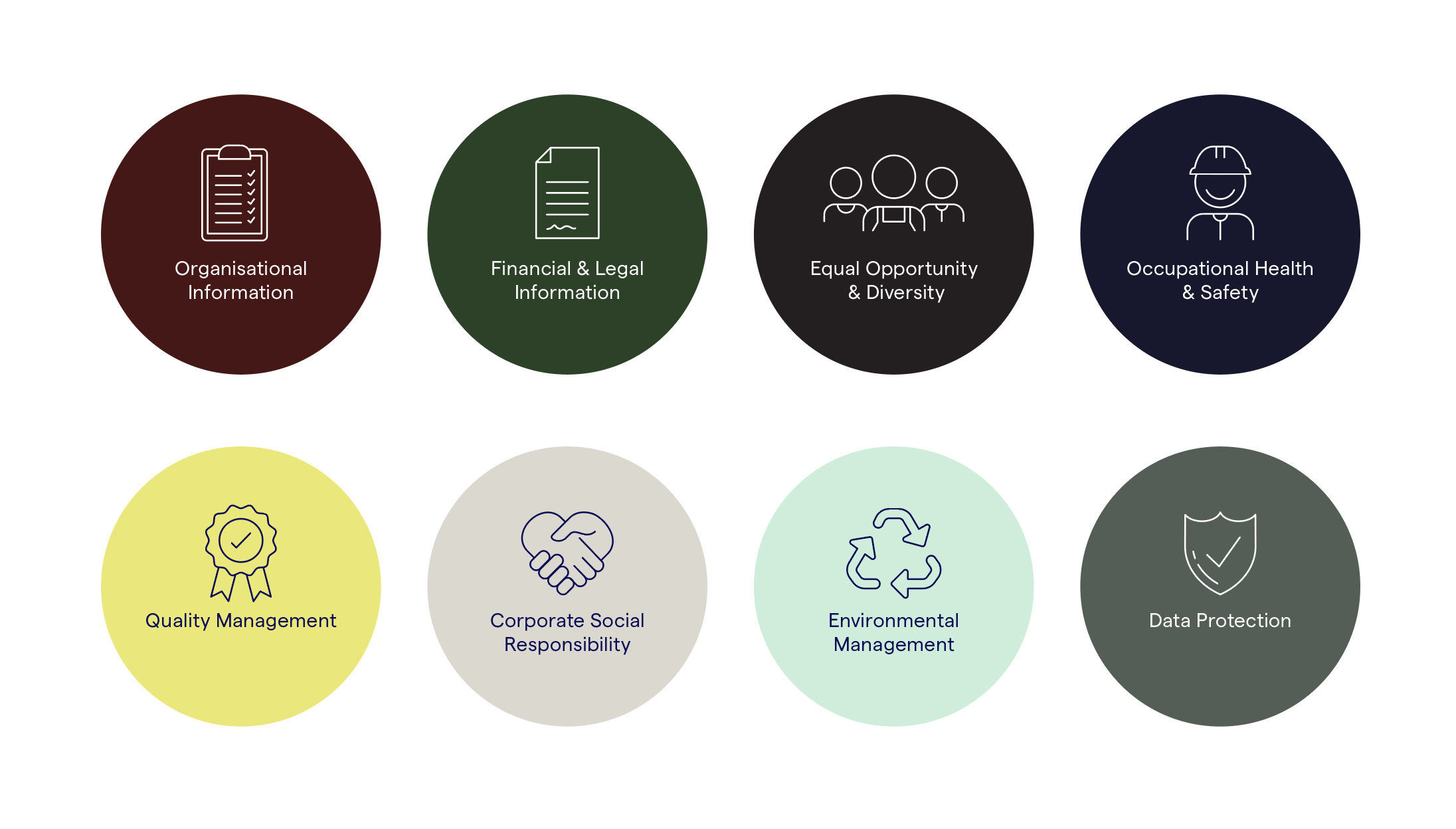The following is a recap of the Q&A section from our live webinar on standardised prequalification - hosted by my colleague Tony Chan and myself. The transcript has been lightly edited for clarity.
Q: Is there a charge to vendors to actually leverage the solution?
A: The answer is no, that's not part of our model.
Our view is vendors shouldn't necessarily pay for the privilege of being part of a framework that's typically governed by the organisation, so there's no charge to the suppliers.
That also means you can get your full supply chain in – the 100% of the supply chain. What we've found is, if there's a payment gateway, you're only going to get your top suppliers and usually holding a pretty big stick as well.
Q: Who is vetting the information coming in from the prequalification?
A: At the moment, the way that the Optiqual® framework is designed, the organisation who are inviting the vendor through that process would continue to vet those vendors according to their own standards.
We don't want to get too much into you know product capability at the moment, but we have some features built into that prequalification functionality that allow you to determine expected answers and automate sections based on the way that the answers are responded to by vendors.
So, effectively, we find that that becomes your desktop audit, so any of those binary responses – yes, no, tick box, drop down – that allows for a great deal of automation on the assessment of the info.
Q: A customer said “We prequalify currently as part of a tender because it's related to a scope. How do we address that?”
A: As mentioned throughout the session, using the solution, you can now prequalify a supplier based on their merits, based on their category.
You don't need to tie it exactly to the scope anymore. You can still do your tender- level due diligence and evaluation, but because 80% of it can be standardised based on the risk in the category, it reduces the need to do that from scratch.
Q: Is Optiqual® a standalone product?
A: Optiqual® is actually a reference framework that is built on the existing Felix platform.
Effectively you can use it as a standalone, complete 100% from the Optiqual® reference framework or if you need to modify them, feel free to modify them.
It does, however, fit as part of our vendor management module. We are a modular solution, so we have customers that use that as a standalone module. You don't have to use the sourcing and contracts functionality.
Q: Is the framework customisation done by Felix or by the user?
A: It is done by Felix in consultation with the with the user, or with the organisation who we engage with. We believe this is a corporate setup so during the implementation process, we will run through some requirements session [where] you can basically pick and choose how much of the Optiqual® questions you're going to use and how much of your own question you're going to use. And we will then configure into the solution for you.
Q: What are the sources of the prequalification questions? For example, which subject matter experts provided input?
A: This is what's coming from those PAS Standards. So, PAS 7000, which is more products and supply. And then you've got the PAS 91, which is a construction standard. So that's where the questions and the requirements come from.
 As for who had input, there was a range of contributors globally into those standards, and we can potentially provide some follow up information as part of the pack that goes as well.
As for who had input, there was a range of contributors globally into those standards, and we can potentially provide some follow up information as part of the pack that goes as well.
Particularly, BSI (British Standards Institution) worked with the industry steering group during the design of those PAS Standards. The steering group provided that subject matter expert input. Basically, what BSI is trying to do is to provide a standard set of questions that is a candidate for an ISO standard in terms of prequal.
They’ve literally done years of work and, I think, the very first one is from 2003 and they published the first PAS in 2014. So almost 11 years of research to get to the point where we can leverage them.
Q: What happens after the suppliers pre-qualified – say 12 or 24 months – later?
A: Great question. Because we understand that a supplier can be prequalified, they may be on a panel arrangement or on something that's going to run for multiple years or long enough time where the information needs to be re-audited.
We have a feature that's purpose-built for this, it's called Re-qualification. At the discretion of the business, an egg timer can be applied – whether it be six months, 12 months, 24 months – and that will automatically reissue the critical parts of the prequalification to the suppliers based on when they were first approved.
Another point to make on that is it doesn't have to be the full prequalification again, it can be select elements that you might need to refresh, whether it's health and safety statistics and anything that needs that periodic renewal can be handled by that Re-qualification.
Q: Is Vendor data hosted by Felix and if so, what data/privacy protection is in place for the Vendor's protection?
A: First of all, all information that is stored on Felix are encrypted in our Amazon web service hosting infrastructure.
We have gone through a number of security audits and have gained the ISO 27001 certification.
To summarise the measure we put in place, there is encryption, there are firewalls and, also in our internal processes, we have basically developed a lot of security processes amongst our workplace to make sure that when the data comes into our platform, our staff will handle it in a manageable manner, in an appropriate manner; it has been audited by both our IT security consultant Cybersix as well as our external Auditor certification auditor BSI.
We're pretty confident that, in terms of security and privacy, we are matching those international standard and security standard.
Finally, the fact that we are putting our stuff on AWS, they are ISO 27000 compliant and literally compliant to almost all information security standard imaginable on Earth.
The fact that AWS could also host government data in that kind of classification gives you some peace of mind.
Q: If a new Vendor is approved by User 1, is the data transferable to User 2 or does the Vendor re-apply to User 2?
A: If in the event we're talking users within an organisation, so within an enterprise account, absolutely. That can flow through in its entirety.
However, if we're talking about user 1 being from a separate organisation as user 2, there is some benefit to the supplier in that they don't need to duplicate every single piece of information – so there's translatable stuff between their enterprise customers.
What we do have is what we call relational data. So, there might be some specific unique questions that's between a supplier and the organisation that it’s supplying to, that's quite specific to that organisation. That is not considered shareable across so, no.
To summarise, there are parts of the information that's stored on the Felix platform that is shareable.
To give you some tangible examples: Insurances, certificates... they can share across based on the vendors selecting who they are engaging, which organisation they're engaging with. They could share those across organisations without re-typing those in.
There is obviously some specific information catered to just a particular organisation, then that is restricted to that organisation only.
Q: Does the system track expiry dates of submitted HSEQ ISO certificates and automatically request new copies?
A: The answer is yes. Anything with periodic renewal can be stored as what we call a compliance document along with the actual physical proof, the document itself, along with the metadata. And that expiry date can drive automated reminders.
What that can then flow through to is if the information that's lapsing makes the supplier or the contractor non-compliant, that can automatically suspend them if the information lapses and they haven't updated it. Coming back to the organisation, that can then be validated. So, yes, it drives automated reminders.
Q: Has the PAS 91 been generated for construction companies only to use?

A: The answer is no. It's a standard.
Yes, it's really good for construction companies because it's sort of well within their industry, but it's also for the prequalification of construction related goods and services.
It's got relevance across a number of verticals that engage construction and capital works type suppliers.
Q: Can we add our own questions to Optiqual®?
A: I think Tony has mentioned that Optiqual® is purely a reference framework. It's a foundation for you to start with.
We have customers that take it off the shelf and that's a really effective, low cost, rapid way to take the solution. However, if you do have some unique requirements, of course we can bake those in.
Want to watch the full recording of the webinar? Click here.
If you'd like to see Optiqual® in action, feel free to reach out to us.

Related Articles

The fundamentals of vendor prequalification: definition, process & enablers
Knowing your third-party suppliers and contractors is no longer a nice-to-have. It’s a prerequisite for supply chain risk management. With supply chains becoming increasingly complex and volatile post-COVID, organisations should re-examine the very processes that underpin how they deliver goods/services.

ISO 9001 in Construction & Engineering: The makeup, benefits and process
International Organisation for Standardisation (ISO) is an independent, non-governmental, global organisation that develops standards to ensure the quality, safety, and efficiency of products, services, and systems.

Why organisations need a standardised vendor prequalification framework
Low productivity and increasing tendering/procurement costs have traditionally been among factors driving downward pressures on margins, for both contractors and their supply chain. Moreover, legislative requirements around sustainable procurement are adding another kind of pressure.
Let's stay in touch
Get the monthly dose of supply chain, procurement and technology insights with the Felix newsletter.




